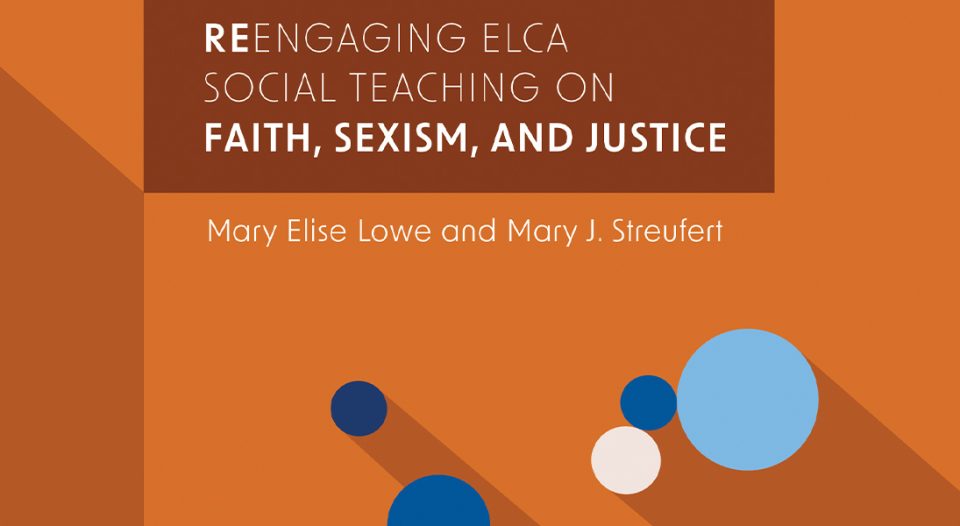Series editor’s note: In 2025, “Deeper understandings” is focusing on the ELCA social statements. We hope to reintroduce them to readers as a means of provoking fruitful, enriching conversation between Christians with different understandings and convictions, and as a springboard for active discipleship in the world. Each article will introduce a particular statement and its Lutheran theological underpinnings, then suggest ways in which it can spark faithful conversation and action in the service of your baptismal vocation.
My hope is that you will find this series relevant to your current context and that it will help you express your Lutheran faith in your daily interaction with family, friends, neighbors and co-workers—for the sake of the flourishing of the gospel of Jesus Christ in the world and the life abundant of the neighbor and stranger.
—Kristin Johnston Largen, president of Wartburg Theological Seminary, Dubuque, Iowa, on behalf of the ELCA’s seminaries
As a professor at an ELCA university, I have the privilege of helping students identify their beliefs and values. I encourage them to recognize that their values and beliefs shape the positions they take on complex social issues. What we as a church believe matters too. Our church’s social teaching guides us as we live as people of faith in complex times.
The 2019 ELCA Churchwide Assembly adopted the social statement “Faith, Sexism, and Justice: A Call to Action.” This summer the 2025 Churchwide Assembly will participate in a worship rite of confession and repentance for the sins of patriarchy and sexism. These actions demonstrate the ELCA’s critique of the death-dealing effects of patriarchy. In contrast, the ELCA announces the good news that every person is created equally in God’s image and called into abundant life (John 10:10). As a lifelong Lutheran, I am proud that “Faith, Sexism, and Justice” offers a vision of a society that is more just for all. I hope this brief introduction will help you engage the social statement more deeply.
Our church’s social teaching guides us as we live as people of faith in complex times.
To begin, “Faith, Sexism, and Justice” teaches that patriarchy is sin. The statement defines patriarchy as “a social system that enables men to have more power than, and power over, women and people who do not conform to socially accepted gender roles” (page 78). It also states that sexism “supports male privilege and reinforces prejudice and discrimination against women and girls” (page 80). We all live amid patriarchal and sexist systems, and women and girls are specifically harmed by these systems.
People experience patriarchy and sexism in different ways. While many women suffer economically by earning less than men, women of color are further harmed by the intersecting sins of sexism and racism. Think about your context: Where do you see women and girls treated as less than men and boys? Where do you see sexist stereotypes that value hypermasculinity and harm men and boys?
Being theologians of the cross
Martin Luther taught the theology of the cross. In contrast to a theology of glory, which might say that “patriarchy is just the way things are,” a theology of the cross calls a thing what it actually is. The social statement names patriarchy and sexism as what they actually are: sins. They are sinful because they distort the biblical witness that all people are equally created in God’s image, and they deny the promise that God’s love revealed in Jesus Christ is for everyone.
“Faith, Sexism, and Justice” is infused with our Lutheran commitment to Christian freedom. Because of the gospel, we are freed through Jesus Christ from sin, death and fear. This liberation also frees us from destructive stereotypes about sex and gender.
I see how some of my students struggle with idealized standards of masculinity and femininity, which can contribute to low self-esteem and negative views about their bodies. Fortunately, many of my students live in the freedom that comes from expressing their sex and gender in ways authentic for them.
Living out one’s Christian freedom also means that we use our freedom to support others. Serving the neighbor was central to Luther’s theology, and it is also core to this social statement. The document uses the concept of neighbor justice to describe our vocation to serve others. It states: “Faith is active in love and love necessarily calls for justice in relationships and in the structures of society” (page 78).
Serving the neighbor was central to Luther’s theology, and it is also core to this social statement.
Pursuing gender justice might involve asking, “Do I spend my time engaging with media that employ sexist images of women and girls?” Or it might mean taking action on issues related to equity for women and girls in health care or in the criminal justice system.
In addition to these Lutheran commitments, “Faith, Sexism, and Justice” celebrates the diversity of creation, including human creation. At a time when LGBTQIA+ people are increasingly marginalized, ELCA social teaching is clear: “God creates humanity in diversity. … [T]his diversity encompasses a wide variety of experiences, identities, and expressions, including sex … and gender …” (page 17). The Scriptures testify to the abundance and diversity of creation, and the social statement echoes this commitment in the expansive welcome that it offers to all.
Challenging patriarchy and sexism may feel overwhelming, but you are not alone. Our social statement and our worshiping communities guide us. As we pursue justice, we trust that the Spirit is present in each of us as we struggle with our own experiences of sexism and patriarchy, empowering us as we tell others they are God’s beautiful creatures who are called to lives of flourishing and justice.
Get this column in your inbox: Visit livinglutheran.org/subscribe and sign up for the free email digest “LL Stories.” Receive the digest weekly, biweekly or monthly, and select the categories that interest you. (“Deeper understandings” is a “Voices of faith” column.)





